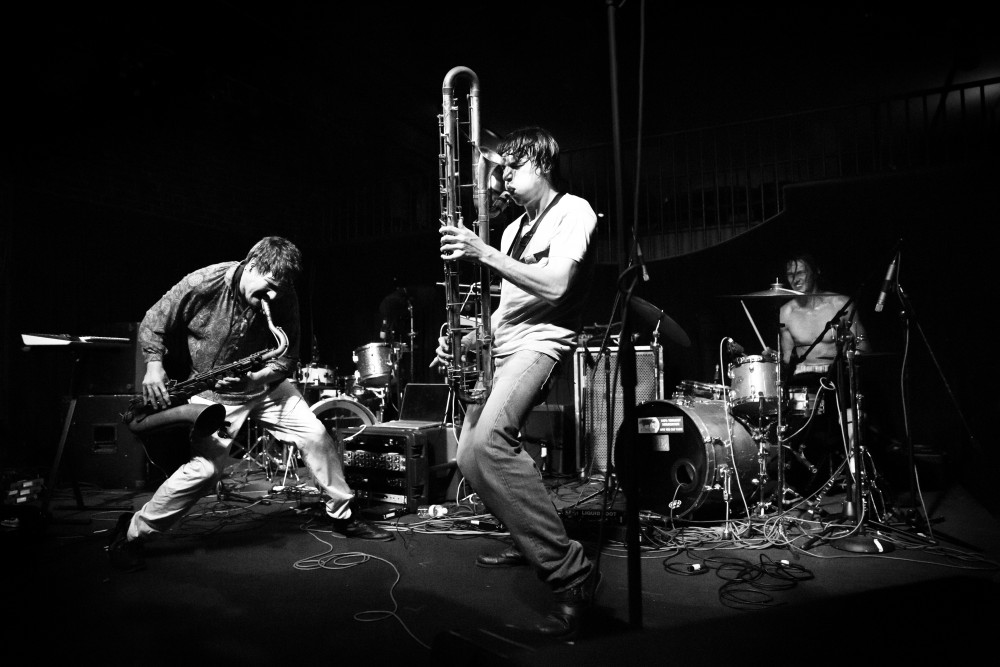Made up of two saxophonists, Mike Wilbur and Wenzl McGowen, and one drummer, James Muschler, Moon Hooch’s sound neither mimics popular music nor echoes the past. It’s of its own category: part electrifying dance music, part experimental mania.
“It’s reminiscent of Béla Bartók and Charles Ives kinda vibes, improvised contemporary classical music,” Wilbur said.
Essentially, they play electronic music on jazz instruments. It’s … eclectric.
Although Wilbur, McGowen and Muschler all studied jazz at The New School in New York City, they met busking in Washington Square Park.
“Mike was there with another drummer,” Muschler said. “He sat in [with us] and our sound was a lot more coherent all of a sudden. With one melodic instrument playing bass and melody, it’s limited, but add another and it makes the music come alive.”
Reputable jazz school by day, buskers by … well, also day. And night. (You know college students don’t sleep.)
“The busking was feeding the posh New York music school. I wouldn’t have been able to stay in college otherwise. But I dropped out anyway, because for one, it was way too expensive, and because Mike Doughty [of Soul Coughing] asked us to go on tour with him,” Wilbur said. “That kinda kicked off our career. When we got back from tour, we went back to the subway because we didn’t want to get real jobs.”
Muschler is the only one of the three who graduated college. He admits this has its limitations, though. “I don’t think there’s anything you can do with a jazz performance degree.”
They’d like people to listen to their music in a “giant dance club with an incredibly nice sound system,” Wilbur said. “Location doesn’t really matter outside of that.”
“And live,” Muschler said.
How did they emerge with such a distinctive style amid pressure as contemporary jazz players either to hark back to a groovier era, or to forgo formal composition altogether in preference of digitally-generated sugar pop?
“You’re influenced by your environment, by the ideas present in your environment, people and the way they act,” Wilbur said. “Living in NYC, the cacophony of screams and laughter, so many sounds. I see a lot of similarities in the way I play with New York. I tend to play with constant sound.”
They trust the creative inspiration of the unconscious, too.
“I don’t think about it too much. I try not to think about anything too much,” Wilbur said. “With art especially, if you think about it too much, it can become contrived. But I do think that playing instrumental music accesses a different part of the listener’s psyche than lyrical music. It’s more feeling-based than thought-based; it touches a more primal part of the human spirit.”
Wonder what Freud would say about that.
“It’s like an abstract painting,” Wilbur said. “Who can really say what the meaning behind the vibration is?”
That’s cool. But it doesn’t explain how their music could be so different from other contemporary jazz musicians.
“I listen to such a breadth of music types that it’s hard to pinpoint exact influences,” Wilbur said. “I think if you’re open, everything can be an influence.” Artists he names who’ve made a prolonged impact on him are John Coltrane, Joanna Newsom, Morton Feldman and John Cage.
“I listen to a lot of Indian classical music,” Muschler said. “And Morton Feldman.”
Whatever the catalyst for their so-called cave music, Moon Hooch enjoys their artistic process. “I really appreciate my past self, which is why I like recording,” Wilbur said. “Often I’ll listen back and learn from those ideas, try to incorporate them again. I think it’s important for artists to do that.”
“If we’re composing together, we usually write as we play,” Muschler said. “Otherwise one of us writes a song and brings it to the table to be modified. I mean, we all have different tastes, so sometimes ideas get shut down … but that can be exciting. The music ends up sounding different than you thought it would.”
Wilbur and Muschler agree that the internet bolstered their popularity. By the end of the year, they’ll have finished five separate tours throughout Europe.
“Without the internet, we definitely wouldn’t be as successful as we are,” Muschler said.
In their NPR Tiny Desk Concert, McGowen’s got a traffic cone sticking out of his sax. Why? “Longer the tube, lower the pitch,” Wilbur said. “It drops the pitch — makes it a bass instrument. We stole it from some city.”
Gimmicky? Maybe. Original? Definitely.
“It’s anthropocentric to think that sound needs to be human,” Wilbur said, “rather than just observing it humbly.”
Moon Hooch will perform at the Fine Line Music Cafe this Saturday.








